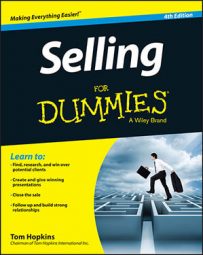The person who isn’t selling isn’t living. Think about that: At some point nearly every day, you’re involved in a selling situation of some sort. You may call it by a different name or not even recognize it as an act of selling, but, all the same, selling it is. Here’s just a short list of the people who sell things and whose “products” you buy:
Actors and actresses: If you’ve ever watched a television show, movie, or play and been caught up in the story, you’ve been a part of a selling situation. The actor has given a believable performance — he’s sold you on his portrayal of a character.
Food servers: The wise server gives you choices of drinks, appetizers, meals, and desserts. He doesn’t just ask to take your order. Why? Because when he employs a bit of salesmanship, he’s almost guaranteed to receive a bigger tip.
Doctors: Doctors get tremendous rewards when they know — and use — selling skills. Not only is your doctor better prepared to convince you to follow his professional advice, but he’s also building his practice because you’re so happy with his advice that you tell your friends and family how great your doctor is, thus sending him referral business.
Lawyers: Lawyers need selling skills in every aspect of their profession. Lawyers have to sell not only to get business but also to persuade judges and juries that their clients are in the right.
Politicians: How does the public develop its expectations about political candidates? How do politicians get elected? They persuade the most people that, if they’re elected, they can and will do the job the voters want done.
Parents: Whether by words or example, parents constantly sell their children values and beliefs. They convince or persuade their kids on what to wear or eat, how to act, who to have as friends, how to be a friend, and thousands of other things children need to learn to grow into happy, well-adjusted adults.
Kids: Few children can go into a store and resist the things shopkeepers purposefully place on the lower shelves to tempt the young. (Considerate of those shopkeepers, isn’t it?) Get ready: You’re about to observe master sellers at work. Notice what kids say and how they act when they try to persuade Mom or Dad to get them what they want. It’s selling at its best.
Spouses-to-be: If you get married someday, you’ll put forth one of the most important sales presentations of your life in persuading your significant other of the value of spending the rest of his or her life with you. And if you’re already married, the trick is to keep persuading your significant other that he made the right choice.
Friends: If your friends enjoy a movie, they’ll probably want to tell you about it — and sell you on going to see it yourself. Your friends may recommend a place to eat or persuade you to go to concerts or sporting events with them. All of these are examples of selling — but they’re also examples of ways your friends build relationships with you. The more memories you share, the closer you’ll continue to be — and so it is with the art of selling.
You’re not immune from selling situations in your daily life — even if you don’t come into contact with professional salespeople — and you may not even be aware that selling has occurred.

